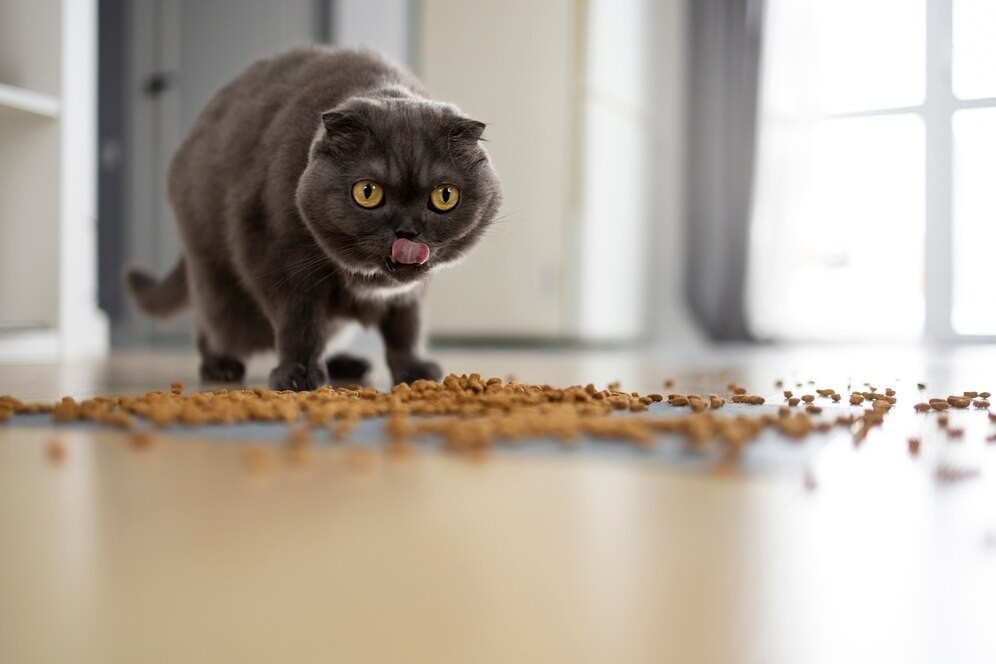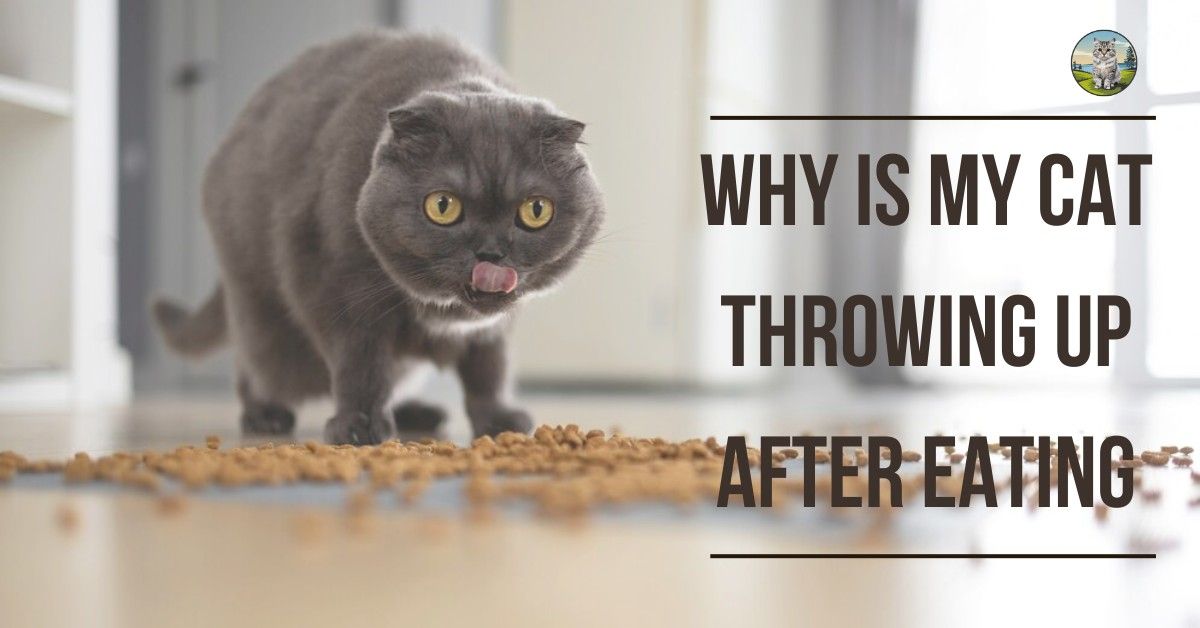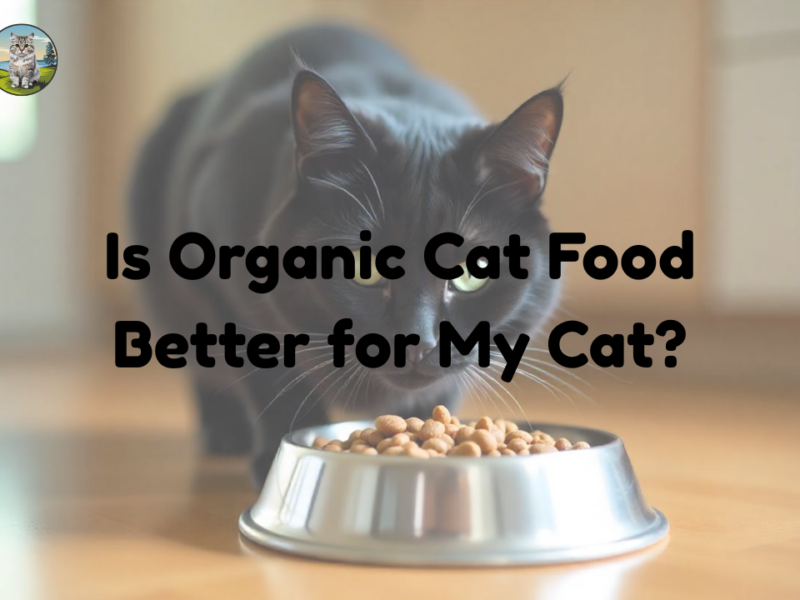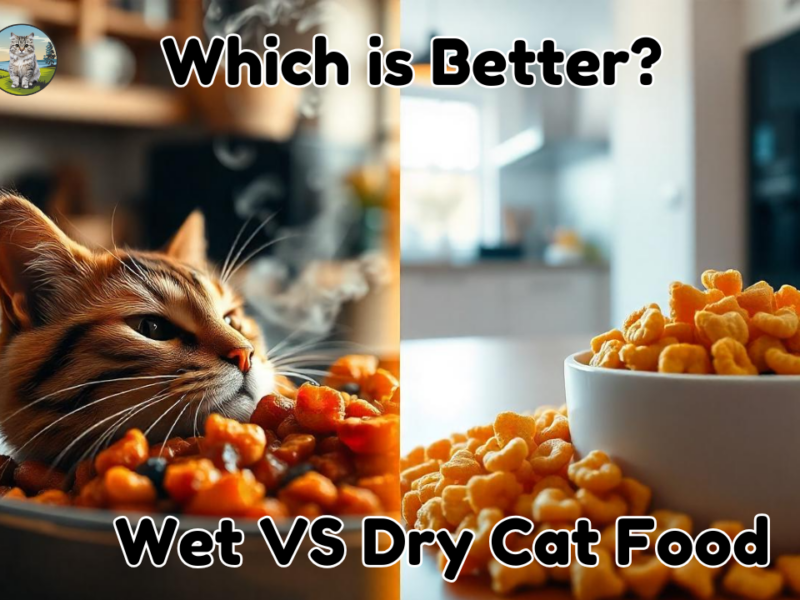Why Is My Cat Throwing Up After Eating? Cats are sensitive creatures with a delicate digestive system. If your cat is throwing up after eating, it can be distressing for both you and your furry friend. Vomiting can occur for various reasons, some minor and some more serious. In this article, we’ll explore why your cat may be throwing up after eating, discuss possible causes, and provide helpful solutions to ease your cat’s discomfort.

1. Overeating or Eating Too Fast
One of the most common reasons your cat might be throwing up after eating is due to overeating or eating too quickly. Cats that gulp down their food in large amounts may not give their stomach enough time to process it, leading to vomiting shortly after a meal.
Why does my cat constantly vomit after eating? If your cat consistently throws up after eating, it’s worth monitoring their feeding habits. Using a slow feeder or dividing their meals into smaller, more frequent portions can help. This allows your cat to pace themselves, making digestion easier and reducing the likelihood of regurgitation.
2. Hairballs and Digestive Issues
Cats groom themselves often, and in the process, they ingest a lot of fur. This fur can clump together in the stomach and form hairballs, which may lead to vomiting. If your cat frequently throws up hairballs, it’s their way of expelling undigested fur that has built up in the digestive tract.
Why would my cat be throwing up? Hairballs can sometimes be mistaken for regular vomiting. If you notice hair in the vomit, it’s likely due to hairballs. However, if your cat vomits without hair present, it could be a sign of digestive issues such as food allergies or intolerance.
3. Food Allergies or Sensitivities
Cats are prone to dietary allergies and sensitivities, just like people. Certain ingredients in their food might not agree with them, causing gastrointestinal distress. This can lead to vomiting after eating.
Why is my cat throwing up after eating? If you’ve recently switched your cat’s diet or introduced new food, it may trigger a sensitivity. Certain proteins, cereals, and additives are common sources of allergies. Consider switching to a hypoallergenic or limited-ingredient diet to see if the vomiting subsides.
4. Eating Grass
You may have noticed your cat nibbling on grass occasionally, only to throw up afterward. This behavior is fairly common among cats, but it leaves many owners wondering why it happens.
Why is my cat eating grass and throwing up? Cats eat grass for various reasons, one being that it acts as a natural emetic, helping them purge their system. While eating small amounts of grass is generally harmless, it may lead to vomiting if your cat ingests too much. This can also be a sign that your cat is experiencing digestive discomfort and is trying to self-medicate by eating grass.
If your cat frequently eats grass and vomits, monitor how often this occurs and consider offering alternative ways to soothe their digestive system, such as incorporating more fiber into their diet.
5. Gastrointestinal Disorders or Infections
In some cases, vomiting can be caused by underlying health conditions such as gastrointestinal disorders, infections, or inflammatory bowel disease (IBD). These issues can disrupt the normal digestive process, leading to vomiting after eating.
Why does my cat constantly vomit after eating? If your cat has chronic vomiting, it’s important to rule out serious conditions. Inflammatory bowel disease, for example, is a long-term condition where the intestines become inflamed, causing symptoms like vomiting, diarrhea, and weight loss. Infections such as gastroenteritis or parasites can also cause vomiting. A visit to the vet is essential for diagnosis and treatment.
6. Foreign Objects
Cats are curious by nature, and they may accidentally swallow foreign objects such as string, rubber bands, or even pieces of toys. If your cat has ingested something that they cannot digest, it can block the digestive tract, leading to vomiting.
Why would my cat be throwing up? Ingesting foreign objects is not only a common cause of vomiting but can also be dangerous. If you suspect your cat has swallowed something inedible, seek veterinary care immediately, as it could lead to an obstruction in the intestines that may require surgery.
7. Stress or Anxiety
Cats are sensitive to changes in their environment. Stress or anxiety from new surroundings, loud noises, or changes in routine can upset your cat’s stomach, leading to vomiting after eating.
Why is my cat throwing up after eating? If you’ve recently moved, introduced a new pet, or changed your cat’s routine, stress could be the underlying cause. Helping your cat adjust to these changes gradually can reduce their anxiety and associated digestive issues.
8. Illnesses Affecting Appetite
Another concern that could cause vomiting in cats is illness, especially if accompanied by a loss of appetite. If your cat is both not eating and throwing up, it could be a sign of a more serious health issue, such as kidney disease, liver problems, or even cancer.
Why is my cat throwing up and not eating? Cats are known for hiding signs of illness, but if your cat is refusing food and vomiting, it’s crucial to get them checked by a vet. Conditions like kidney disease or liver disease can cause nausea, leading to a loss of appetite and vomiting. For these disorders to be managed, early diagnosis is crucial.
Solutions for Cats Throwing Up After Eating
If your cat is throwing up after eating, try the following solutions:
Slow Feeder Bowls: Slow down your cat’s eating by using slow feeder bowls or puzzle feeders. This helps prevent overeating and allows the digestive system to process food more effectively.
Feed Smaller, More Frequent Meals: Instead of two large meals a day, try offering smaller meals more frequently to avoid overloading your cat’s stomach.
Hydration: Ensure your cat is properly hydrated. Dehydration can worsen vomiting and digestive issues.
Switch to High-Quality or Sensitive Stomach Food: If food sensitivities are suspected, consider switching to a high-quality, grain-free, or limited-ingredient diet.
Consult Your Vet: If your cat’s vomiting persists or is accompanied by other symptoms like lethargy, weight loss, or diarrhea, it’s essential to consult a vet for a proper diagnosis.
Conclusion
While occasional vomiting in cats may not be a cause for concern, frequent vomiting after meals is something to address. Understanding the reasons behind your cat’s vomiting, such as overeating, food allergies, or underlying health conditions, can help you find the right solution to keep your feline friend happy and healthy.
FAQs: Why is My Cat Throwing Up After Eating?
1. Why does my cat keep throwing up after eating?
Your cat might be eating too quickly, which can lead to regurgitation. Other reasons include food allergies, hairballs, or underlying digestive issues. Slow-feeder bowls or breaking meals into smaller portions can help prevent this.
2. Why is my cat eating grass and throwing up?
Cats sometimes eat grass to induce vomiting, which helps them expel hairballs or ease digestive discomfort. While occasional grass eating is normal, frequent vomiting may indicate an underlying issue that requires attention.
3. Why is my cat not eating and throwing up?
If your cat refuses food and vomiting, it could be a sign of serious health conditions like kidney or liver disease. It’s important to consult a veterinarian to rule out any life-threatening illnesses and ensure your cat gets proper treatment.
4. What should I do if my cat is vomiting every day?
Chronic vomiting isn’t normal and should be addressed by a vet. Possible causes include gastrointestinal disorders, infections, or food allergies. Your vet can help determine the exact cause and recommend the right treatment plan.
5. Can stress cause my cat to vomit after eating?
Yes, stress or anxiety can affect your cat’s digestive system, leading to vomiting after meals. Changes in environment, routine, or even introducing a new pet can trigger stress in cats. Reducing stressors can help prevent this.


